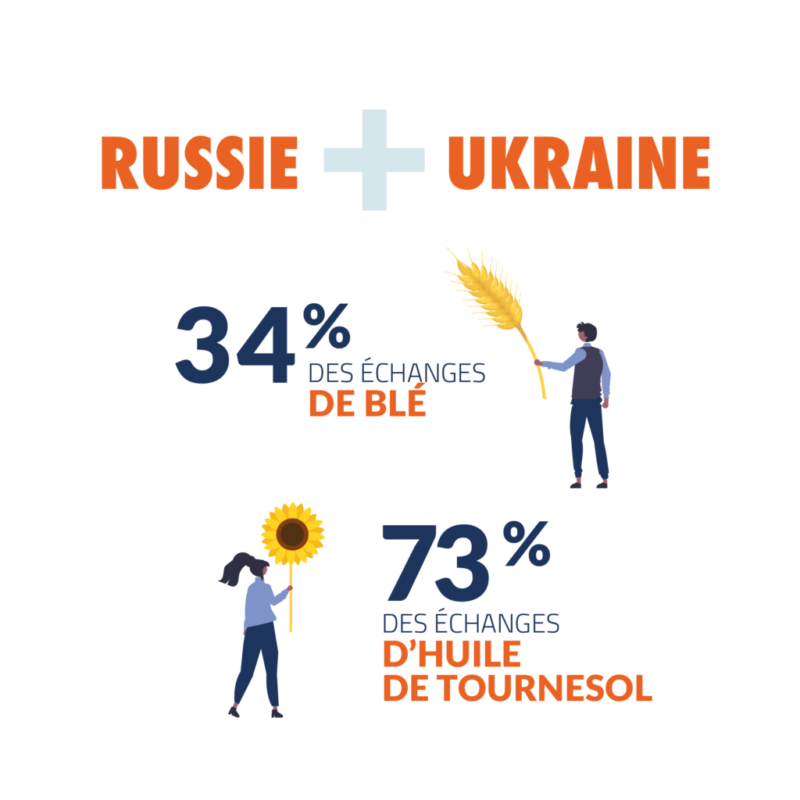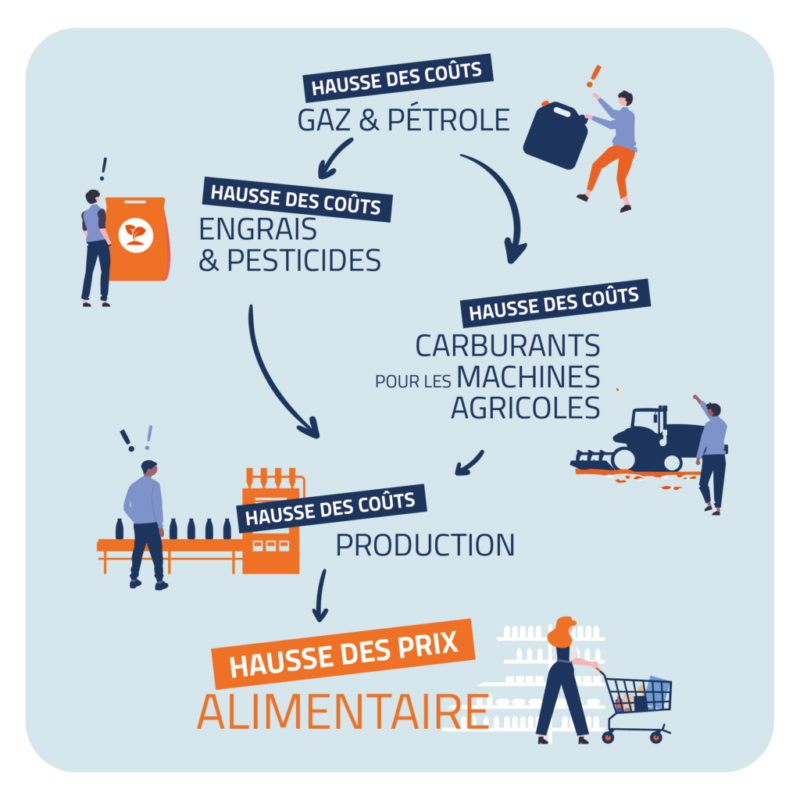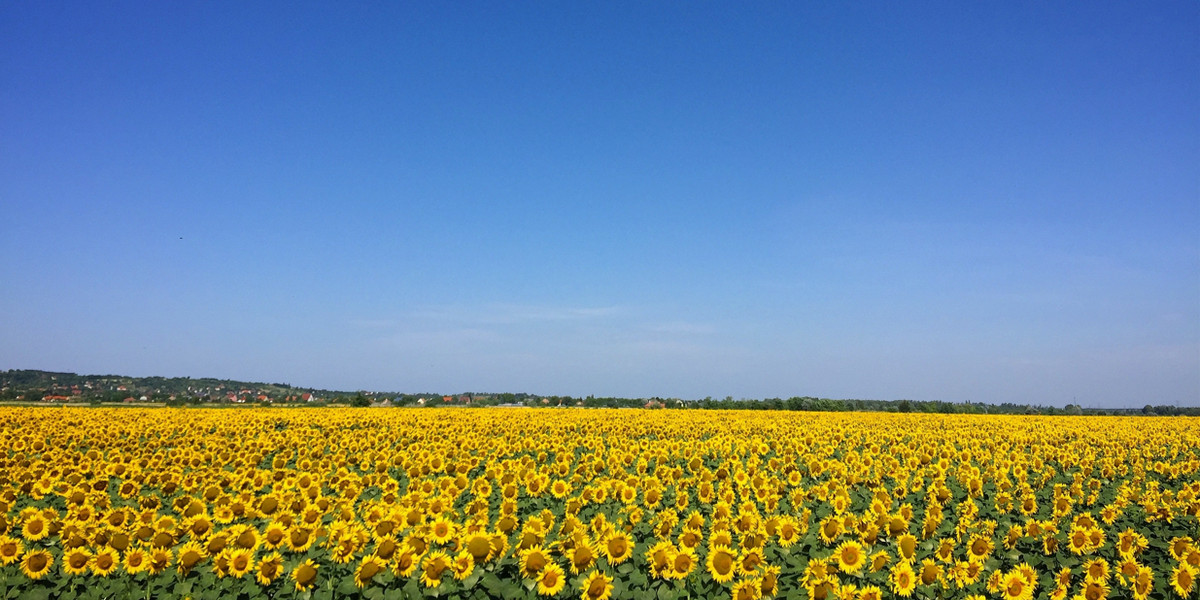In this interview, we discuss with Valentin Brochard, Food Sovereignty Advocacy Officer at CCFD-Terre Solidaire (CIDSE’s member in France), about the current food crisis, its triggers and possible solutions. Several CIDSE member organisations are involved in this issue as well, some references can be found below
We are hearing about a global food crisis: what actually is going on?
Hunger has been increasing for 6 years globally: we can talk about a global and structural food crisis in which 2.4 billion people, roughly one third of the world population, suffer from food insecurity. This affects both people in the “Global North” and in the “Global South”. In Europe for example, 10% of the population suffers from food insecurity. There are some structural reasons behind this, which find their origin in our economic, agricultural and food systems:
- We are seeing a rise of conflicts in the world: as it is the case for the war in Ukraine, hunger is used as a weapon of war; for example, fields are destroyed and people are forbidden from going to markets. Concretely, conflicts create hunger.
- Extreme climate events such as floods and droughts are on the rise and they are the first cause of agricultural loss in the world.
- There is a rise of inequalities: 3 billion people don’t have access to healthy food, even though globally we produce enough to feed everybody. Hunger is not a production problem, it is a justice issue, related to the sharing of resources and financial access. It might seem absurd, but 50% of the people affected by hunger are small agricultural producers. We can say that the current globalised food system is a vector of inequalities.
Moreover, there are currently two aggravating factors: the first one is the COVID-19 pandemic, which exposed the weaknesses of our food and agricultural system: it unveiled problems caused by the interdependence between countries. The second factor is that there is an ongoing rise in food prices, which had already started two years before the war in Ukraine; in 2021 only, international food prices had seen an increase of 30%.
Why is some countries’ food security at risk in our current global food system?
One important reason is that States didn’t live up to their food sovereignty, they didn’t make it a priority. Many countries are hyper-specialized in a specific type of food production, starting from the principle that they will export on foreign markets and rely on imports for their food security.
Where is the crisis mostly felt today? How are the local population and local peasants reacting to it?
We should specify that there are two main crises related to food: the wheat and corn crisis and the food prices’ crisis, which are affecting people in different ways.
Regarding the wheat and corn crisis, in the short term the most affected are the direct importers of wheat and corn from Russia and Ukraine (e.g. Eritrea), in the mid-term, all the countries that are importers of these cereals will be affected at different levels. This depends on the amount of those cereals used in people’s nutrition, in particular, which percentage of the food they eat is made of those cereals.
The spike in food prices on the other hand, will affect all countries! But poorer countries with high levels of debts, and without social protections will feel the worst effects of this food crisis. This is why it is necessary for States to have the financial capacity to face this crisis. They must be able to feed their population and to re-invest in their agriculture. It’s therefore also crucial to move towards the cancellation of debt of these countries. It’s simply impossible for poor countries to be able to pay their debt, reinvest in their agriculture, face social troubles that will rise from this situation and to pay high food prices from international markets.
What are the effects of the war in Ukraine on the food crisis?
The war in Ukraine will dramatically worsen the global food situation. It will trigger an increase in cereal prices and global food prices. Russia and Ukraine are both huge exporters of wheat and corn and other products (Russia and Ukraine cover 12% of all the calories exchanged at the world level, 23% of world export of wheat, 16% of world export of corn, and 73% of sunflower oil).

During the war they can’t or they don’t want to export as much as they were doing before: at the beginning of the war Russia blocked the Black Sea which was used to export Ukrainian goods. Later, the Ukrainian government itself banned all food exports to keep food for their population, which was an absolutely necessary measure also considering that the Russian army is destroying Ukrainian food stocks.
On the Russian side, international economic sanctions have reduced their exports’ capabilities, and at the same time, the Russian government uses the halt in the exports with the goal to put pressure on governments, using hunger as a tool to convince some States to stay neutral and not side with NATO or Ukraine in this war.
This situation also causes a lot of speculation and some countries (e.g., China and Morocco) started buying food stocks because they know that the worst part of the food crisis is still to come and they want to protect food security in their country. At the same time, other countries are for the same reasons stopping their exports; Indonesia for example stopped exporting palm oil and more recently India decided to ban its wheat export as Indian food security is in jeopardy due to dramatic heat waves and droughts.
Is there a connection with the increase in energy prices?
The rise in food production prices will keep increasing at the world level especially because of the crisis in energy prices. Gas prices have surged 72% since the beginning of the war, while oil prices are fluctuating. These prices directly affect food prices because we need energy to produce, process, transport and consume food. The prices of fertilizers are also connected to the energy prices since they are derived from oil or gas. In addition, countries affected by this conflict are massive fertilizers’ exporters: 12,6% of global exported fertilizers come from Russia and 5,2% come from Belarus (which follows Russia behavior on its export restriction policy).

What has been the international reaction to the food crisis?
At the international level, different actors have been moving ahead in a scattered way. France has promoted their initiative “Farm”, the USA is trying to push forward an initiative at the IMF level, the UN Secretary General is pushing for his own initiative, the FAO has again another approach and so on and so forth. Concretely, there is no real international coordination to answer this crisis, which is a crisis of access and a crisis of regulation and coordination. While its causes differ, it follows the same path of the previous food crises in 2008-2009 and 2012, and if there is one thing to learn from these crises, it is that the lack of international coordination amplified their effects. If there had been a good coordination, we would have avoided speculation, and we would have avoided counter-productive responses from States.
What do you think about the “feed the world” rhetoric?
This is an approach that frankly makes no sense. Historically, Europe has been harming the food security of poor countries rather than “feeding the world”. It’s not our exports that feed the world, it is however our exports that de-stabilize markets and create harmful competition in local markets. This is for example the case when we sell subsidized powder milk at too competitive prices or when we export our wheat for very low prices to Senegal or in Latin America, directly affecting the local production of cereals.
We also have to understand that this is not a crisis of production. It’s too easy to say: “we have a food crisis, so we have to produce more”. This is actually a regulation crisis. We will have a better impact if, for instance, we have a moratorium on biofuels, if we stop speculation on food prices at international level, if we coordinate transparently around stocks at international level.
What can civil society do in the face of these crises?
Organisations like CCFD-Terre Solidaire and CIDSE should focus on advocating towards international coordination and raise awareness among citizens on the real issues around the food crisis and how to solve it. In the short term, we should push for a set of international rules to limit the impacts of the crisis. In the medium term, we should push to start a change of our agricultural systems, to make them more sustainable and diversified, to shift towards food sovereignty and agroecology. We should also raise our voice on the necessity of cancelling debts for poor countries to increase their chances to react to the crisis. We should also support the most vulnerable people through humanitarian aid and humanitarian corridors.
-ENDS-
Want to know more?
Several CIDSE member organisations are working on the food crisis:
- Broederlijk Delen: https://broederlijkdelen.be/nl/nieuws/de-agro-industrie-probeert-alleen-zichzelf-te-redden
- CCFD-Terre Solidaire : https://ccfd-terresolidaire.org/crise-alimentaire-limpact-de-la-guerre-en-ukraine/
- Cordaid: https://www.cordaid.org/en/news/how-can-we-stop-crises-like-the-russian-war-in-ukraine-from-spurring-food-insecurity-in-africa/
- Entraide et Fraternité: https://www.entraide.be/un-ouragan-de-famine
- Fastenaktion: https://fastenaktion.ch/fastenaktion-erwartet-schlimme-konsequenzen-fuer-projektlaender/
- Misereor: https://www.misereor.de/spenden/spendenaufrufe/hunger-in-afrika

Valentin Brochard, Food Sovereignty Advocacy Officer
CCFD-Terre Solidaire
Credits infographics, CCFD Terre Solidaire
Cover photo: K. Zolan, Pexels.com

